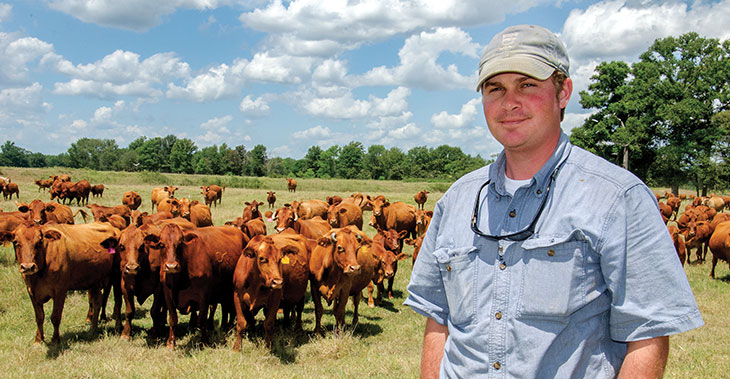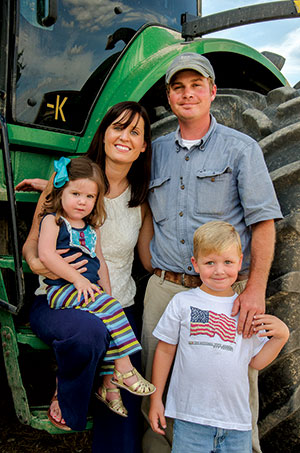
Cullen Kovac
Photos by Sheryl Smith-Rodgers
When the Louisiana Land Bank Board of Directors needed to fill an unexpired term on their board last year, they didn't look for a seasoned veteran of farm organizations. Rather, they chose a 29-year-old cattle producer from Oak Grove, La.
Cullen Kovac was half the age of some of the existing directors when he was appointed in February 2012, but what he lacked in boardroom experience, he made up for in enthusiasm.
“We were looking for someone who was educated, had plenty of drive, and was interested in helping us reach out to young farmers to extend the necessary financing they might be lacking,” explains Land Bank Board Chairman Dr. Ernest Girouard. “Cullen was aggressive in bettering his leadership skills and his knowledge of cattle farming.”
Louisiana Land Bank stockholders shared the board's confidence in Cullen, electing him five months later to a three-year term on the board.
“Cullen had a broad range of involvement in agriculture, such as the Farm Bureau's Young Farmer and Rancher program,” Girouard says. “Plus he already had a good understanding of Farm Credit, having participated in the Farm Credit Young Leaders Program in 2010.”
Now 30, Cullen says he has learned a great deal about business since joining the board. But he also draws from experience and strong family ties to agriculture: He has been in the cattle business since age 21, and has owned cattle all of his life.
“My grandfather George Kovac gave my father, Mike, a heifer on the day he was born,” Cullen explains. “Dad did the same for me the day I was born. Then I gave my son, Will, a heifer when he was born four years ago.”
Third-Generation Cattleman
Cullen's family arrived in northeastern Louisiana in 1927, when his grandfather George Kovac emigrated from Croatia to West Carroll Parish, working first in the timber industry and then purchasing 400 acres and starting a farm and raising cattle. His father, Mike, continued to keep a couple hundred head of cattle, even while working as director of the Livestock Brand Commission in Baton Rouge, where Cullen was born.
Cullen was 10 when his family moved back to the farm. Working alongside his dad, he became active in 4-H and FFA, and showed beef cattle all the way to the national level. Thus, it wasn't surprising when he chose to major in animal science at Louisiana State University.
Midway through his college education, Cullen interned at the Henry C. Hitch Feedlot in Oklahoma. The experience motivated him to take out a Farm Service Agency loan and purchase 175 cows while still in school. During the week, he would attend classes, and on the weekends, he would head home to tend his herd.
Three years after graduation, Cullen and his father formed Kovac Cattle Company and started raising a composite of the Gelbvieh, Red Angus and Brahman breeds. Today, the Kovacs have four full-time employees who help them produce cattle and hay on 5,200 acres of owned and leased land. They finish the feeders in the Hitch feedlot and retain ownership or sell directly, depending on the market, and keep some of the heifers as replacements.
According to Lee Overby, a soil conservation technician with the USDA Natural Resources Conservation Service, the Kovacs manage their place more efficiently than many producers do.
“You can't just throw 80 cows on 80 acres and expect them to do well. The Kovacs use sound conservation practices that utilize rotational grazing and irrigation,” he says.

Sarah Beth and Cullen Kovac with their children, Callie, left, and Will.
Photos by Sheryl Smith-Rodgers
Grass Farmers, Not Cowboys
Cullen is quick to point out where they place their priorities.
“We're not cowboys. We're grass farmers!” he says. “If you can't grow grass, then your cattle won't perform. Every year, we invest in capital improvements on our ranch.”
In 2012, they built a 60-by-100-foot commodity barn that enables them to buy feed in the summer when prices are lower and store it for winter feeding. They also have erected several hay barns themselves, which store up to 2,700 large rolls of hay.
“We're not a big operation, so we have to be efficient,” Cullen says.
Every year, the Kovacs precision-level a piece of land, then add irrigation and sprig grass on it to help them meet their winter forage needs of about 5,500 bales of hay. Their haying crew consists of one mower conditioner, one rake and one baler, with one man per tractor per 1,000 acres.
“That's pretty efficient in this part of the country,” Cullen says.
Not surprisingly, he is continually looking for ways to cut costs.
“We do everything ourselves,” he says. “We build our own fences and gates, lay our own irrigation pipes, and do our own plumbing and welding. We also doctor our animals. We buy our medicines in bulk at discounted prices and share those savings with neighboring producers. We don't make any money, but it lowers our own costs.”
He also sells sprigs of the Russell and Jiggs bermudagrasses for extra income.
Partnering With the Land Bank
For operating funds, Kovac Cattle Company relies on Louisiana Land Bank.
“They're a genuine partner,” Cullen says. “I have always been a fan of the cooperative system.”
As a cow-calf and stocker operator, he says he never knows when he will find an opportunity to make a large cattle purchase.
“When I do, I just log on to the association's Ag Banking Online and make a draw,” he explains. “When I sell, I do the same thing, but transfer the funds back to my loan. It's a real simple system.”
Cullen and his wife, Sarah Beth, an assistant high school principal, also have several pasture and farm real estate loans with Louisiana Land Bank.
The parents of two children, Will, 4, and Callie, 2, they are both involved in agricultural organizations, with Sarah Beth serving on the Louisiana Farm Bureau's Ag in the Classroom committee.
“I'm a big believer in teaching kids about agriculture,” she says. “These children need to know where their food comes from.”
Statewide Honors
Two highlights of the couple's farming career came in 2009, when Cullen won the Outstanding Young Agricultural Producer Award from the North Louisiana Agri-Business Council and the Louisiana Farm Bureau Young Farmer and Rancher Achievement Award.
A year later, he and Sarah Beth were selected to participate in the annual Farm Credit Young Leaders Program, which gave them the opportunity to meet government, financial and agricultural decision-makers in New York City and Washington, D.C.
By 2012, Cullen's leadership potential was apparent to Louisiana Land Bank's directors, who appointed him to fill the vacancy on their board.
“If you care about the industry you're in, you should want to be where decisions are made that set the direction of your industry,” Cullen says.
He admits that at first he felt nervous being the youngest at the boardroom table, but says his fellow directors treated him with respect and his confidence soon grew.
“The directors know what we need to do to get to the next level,” he says. “We have plowed some long rows since my short time as a director, and I am honored to be a part of that.”
A Can-Do Attitude
Girouard, the board chairman, says that a young person can offer fresh ideas and a can-do attitude to a co-op board.
“A busy young farmer will make time for it if they see the need,” Girouard says. He now views Cullen as a “seasoned member” who is always prepared for meetings.
“He brings a new perspective that has proven to be extremely valuable in evaluating the direction the bank should consider,” Girouard says. “Cullen's commitment to the responsibilities of a board member contributes to the standards of our bank, which include honesty, integrity, impartiality and conduct.”
But it's Cullen's commitment to agriculture and to the next generation that motivates him to represent his fellow stockholders on the Land Bank board.
“Yes, I love farming,” he reflects. “When I'm out here, driving around, I think, 'Yeah, this is pretty cool.' My son, Will, just started pre-kindergarten. The other day, he asked me, 'Why can't I just stay with you and go to farmer's school?' I think that's pretty cool, too.”